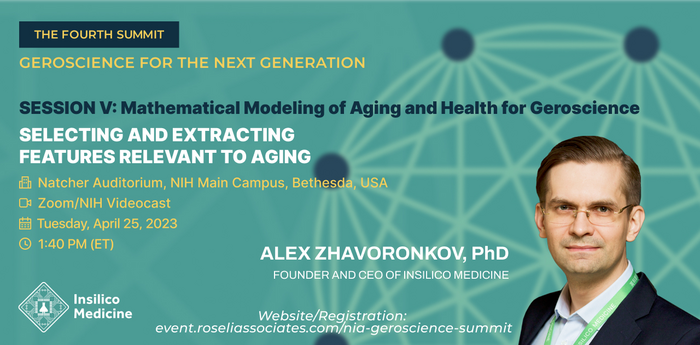Alex Zhavoronkov, Ph.D., the founder and CEO of Insilico Medicine, is a pioneer in generative AI for drug discovery and in revealing dual pathways for aging and disease and will present at The Fourth Summit.

Dr. Zhavoronkov will present on “Selecting and Extracting Features Relevant to Aging.” Image Credit: Insilico Medicine
Geroscience for the Next Generation has been organized by the Geroscience Interest Group of the National Institutes of Health (NIH) and the US Department of Health and Human Services, taking place on April 24-26, 2023, at the NIH Main Campus in Bethesda, Maryland.
Zhavoronkov will speak on April 25th, 2023, at 1:40 pm ET as part of the session on Mathematical Modeling of Aging and Health for Geroscience on a study entitled “Selecting and Extracting Features Relevant to Aging.”
The focus of Insilico has been on the intersection of aging and disease right from its inception, and Zhavoronkov is a leading expert in the longevity space and one of the founders of the Aging Research and Drug Discovery conference.
When deep neural networks (DNNs)—known to be the drivers of artificial intelligence (AI)—started matching humans in the mid-2000s, the Company began training DNNs on human “multi-omics” data and further retraining them on disease.
DNNs gave us the ability to generate massive synthetic data with age as a generation condition. And we could use these DNNs to better understand human disease and aging biology.
Alex Zhavoronkov Founder and CEO, Insilico Medicine
The Company took a step to build an end-to-end AI-driven drug discovery platform known as Pharma.AI, including drug design (Chemistry42), target discovery (PandaOmics), and clinical trial prediction (InClinico).
In 2022, Insilico made use of this platform to determine 145 aging-related therapeutic targets throughout diseases such as Parkinson’s, Alzheimer’s, and osteoarthritis, which were additionally narrowed into nine promising dual aging and disease targets.
The study outcomes were reported in the journal Aging.
The lead therapeutic candidate of Insilico, for the aging-related lung disease idiopathic pulmonary fibrosis, has received positive topline outcomes in Orphan Drug Designation from the FDA and Phase 1 clinical trial.
Geroscience, the study of interventions to postpone or halt the functional decline linked to aging-related diseases, is a rapidly increasing field.
One of the significant difficulties in the field is how to quantify the whole health and rates of aging. This is to precisely evaluate the conditions or interventions that retard or speed up aging, particularly as part of the clinical outcomes. Hence, making use of AI and mathematical modeling could offer essential ideas.
The acceleration of AI technology has had significant impact on aging and longevity research. First, we were able to identify biomarkers for aging. Now, we are using those insights to transform the entire drug discovery process.
Alex Zhavoronkov Founder and CEO, Insilico Medicine
Journal Reference
Pun, F. W., et al. (2023) Hallmarks of aging-based dual-purpose disease and age-associated targets predicted using PandaOmics AI-powered discovery engine. Aging. doi.org/10.18632/aging.203960.